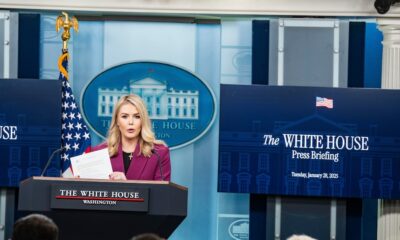The Atlantic’s explosive report on an alleged leak of U.S. military plans has come under fire, with White House Press Secretary Karoline Leavitt denouncing it as “sensationalist” and misleading. The controversy erupted after Atlantic editor-in-chief Jeffrey Goldberg claimed he was inadvertently added to a private Signal chat involving high-ranking members of President Donald Trump’s national security team, where plans for a strike on Yemen’s Houthi rebels were allegedly discussed.
Leavitt took to X (formerly Twitter) on Tuesday to challenge the credibility of Goldberg’s report, arguing that he is “well-known for spinning stories to fit a sensationalist narrative.” She also pointed out The Atlantic’s history of being mocked by conservative influencers who often ridicule its reporting and call its credibility into question.
Goldberg’s article, published Monday, alleged that White House National Security Advisor Mike Waltz mistakenly added him to a private Signal chat where Defense Secretary Pete Hegseth, Secretary of State Marco Rubio, Vice President J.D. Vance, and other top officials were discussing an imminent military strike. The report claimed that Hegseth shared highly sensitive operational details just hours before the attack on Houthi positions was carried out.
“What I will say, in order to illustrate the shocking recklessness of this Signal conversation, is that the Hegseth post contained operational details of forthcoming strikes on Yemen, including information about targets, weapons the U.S. would be deploying, and attack sequencing,” Goldberg wrote in The Atlantic.
Leavitt swiftly refuted these claims, stating that no classified material or war plans were ever discussed. “No ‘war plans’ were discussed. No classified material was sent to the thread. The White House Counsel’s Office has provided guidance on a number of different platforms for President Trump’s top officials to communicate as safely and efficiently as possible,” she wrote.
She also emphasized that the administration remains focused on its mission, adding, “Thanks to the strong and decisive leadership of President Trump, and everyone in the group, the Houthi strikes were successful and effective. Terrorists were killed, and that’s what matters most to President Trump.”
When asked about the report, President Trump himself appeared unfazed. Speaking with reporters on Monday, he dismissed the claims outright. “You mean the attack on the Houthis? Well, it couldn’t have been very effective because the attack was very effective,” Trump stated. He further downplayed The Atlantic’s credibility, remarking, “I don’t know anything about it, you’re telling me about it for the first time. The Atlantic is not much of a magazine.”
Despite the administration’s strong denials, the report has caused ripples in Washington, D.C. Anonymous White House insiders told The Wall Street Journal that many staffers are in “wait-and-see” mode regarding Waltz’s future. While there is no immediate indication that Trump will demand his resignation, sources suggest that he is particularly focused on protecting Hegseth. Replacing the national security advisor—a position that does not require Senate confirmation—would be a relatively simple move should the president decide to make a change.
“Trump asked aides on Monday how Waltz could be so sloppy,” one official reportedly told The Wall Street Journal.
The administration has confirmed that it is investigating how Goldberg was mistakenly added to the chat. While it remains unclear whether any action will be taken against Waltz or other officials involved, the situation highlights the heightened scrutiny surrounding Trump’s second-term national security policies. Meanwhile, the White House remains steadfast in defending its handling of military operations and downplaying the impact of The Atlantic’s latest controversy-laden story.
